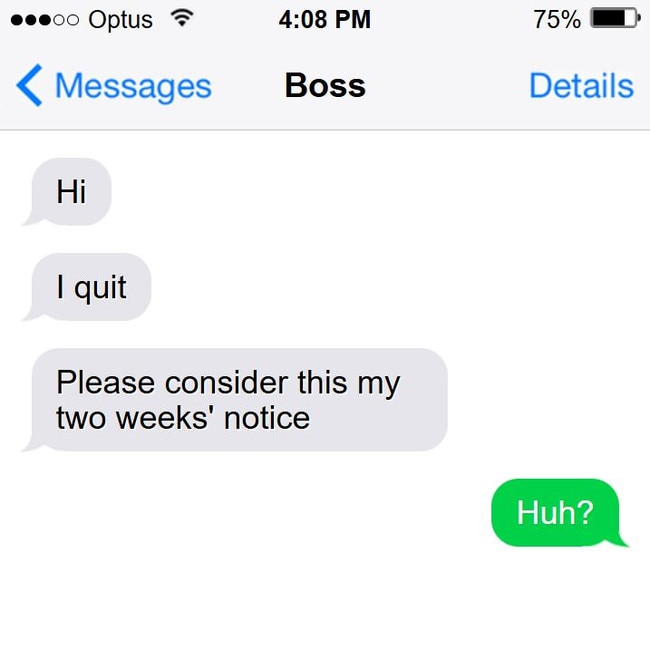‘Time bomb’: Sign Australian workplaces could be hit by mass resignations
Bosses have been warned that workplaces across the country could soon face a major shake-up, and the recent rate cut could be the thing that kicks it off.
Business
Don't miss out on the headlines from Business. Followed categories will be added to My News.
Australians were given a welcome hint of relief this week when the Reserve Bank cut the interest rate and, while it doesn’t mean struggling mortgage holders are completely out of the woods, it could be enough to kick off a trend that will leave bosses scrambling.
On Tuesday, the RBA announced rates would decrease from 4.35 per cent to 4.10 per cent - marking the first drop in four years.
The major banks quickly followed suit, announcing they would all cut their home loan rates by 0.25 per cent.
It has been a gruelling few years for Australians, with the brutal rate rises coming off the back of soaring inflation, adding to already high cost of living pressures.
While this is just the first in what many homeowners hope will be a series of rate cuts, bosses have been warned that it could be a sign Aussie workplaces may soon be in for a major shake-up.
A new report has found a whopping 43 per cent of Australian workers surveyed are ready to ditch their jobs the moment the economy improves.
The findings are a part new research from HR platform HiBob, which surveyed almost 1000 employees and found a growing disconnect between employee expectations and workplace realities.

MORE: Should you stay in your job when your colleagues are quitting?
While three in four workers plan to stay in their current job for the moment, half of those are only doing so due to the current economic situation, not because they feel genuine satisfaction at work.
The recent RBA decision could be enough for some workers to start updating their resumes and reaching out to recruiters in preparation for finding a new role.
Speaking to news.com.au, Sabrina Scherm, Customer Success Manager at HiBob, said businesses should start getting prepared for a spike in people quitting.
“A single rate cut won’t spark an immediate wave of resignations. But, it is a sign that the economy is improving, which is enough to get people thinking about their jobs,” she said.
“If we see another cut on 1 April, businesses should expect a steady rise in job movement, as employees gain confidence in the economy and take the leap.”
The stage is set for a potential talent exodus, with the research finding many workers are feeling undervalued, under-recognised, and lacking clear career paths.
The way Aussies want to work has changed, with more employees - particularly younger staff - rejecting hustle culture and focusing on achieving a better work-life balance.
This means traditional career progression paths, where employees are expected to put in extra (often unpaid) hours in order to get ahead, isn’t something that appeals to a modern workforce.
MORE: How to quit a job
Of those surveyed, just 28 per cent said they would extend their work hours to secure a promotion, and just 34 per cent said they would be willing to take on additional workload to advance.
In fact, over half said they would even delay their career progression in exchange for a better work-life balance.
Damien Andreasen, VP of APJ at HiBob, said the research has shown that Australian businesses are sitting on a “talent time bomb”.
Employees may appear content now, but he warned may of them are biding their time until the economy improves enough that they feel comfortable jumping ship.
“Unless companies proactively address the underlying drivers of dissatisfaction – from a disconnect between hard work and actual career progression to poor guidance and feedback – a mass exodus is inevitable,” Mr Andreasen said.
Australians still value hard work, and believe it should be rewarded, but are rejecting the outdated idea that it needs to come at the expense of their wellbeing.
“If businesses continue to link career growth to overtime, they’ll push their best people away. And with 75 per cent of employees backing the Right to Disconnect, it’s clear that the future of work isn’t about staying late but about working smarter,” Mr Andreasen said.
The Right to Disconnect legislation kicked in on August 26, 2024, giving staff working at a business with 15 or more employees the right to refuse contact outside of their working hours, along with the right to refuse to monitor, read or respond to contact from an employer or third party.
These rules will also apply to small businesses starting on August 26 of this year.

A recent analysis by the Centre for Future Work found that the laws have already had a huge impact on workers, with the amount of unpaid overtime being completed by Aussies falling from 5.4 to 3.6 hours per week – a 33 per cent reduction.
This isn’t the first time in 2025 that employers have been warned they could soon be facing a wave of resignations.
Unsurprisingly, money is a big focus for workers heading into this year, and they feel so strongly about getting a raise that they are willing to look elsewhere to get it.
Recent research by specialist recruiter Robert Half found that more pay is the primary objective for about a third of those surveyed, with this figure rising to almost two-thirds when workers were asked to rank their top three preferences.
While most workers feel confident their pay needs will be met by their current employer, 28 per cent said they would actively look for a job if their request is denied.
A further 37 per cent said they would passively look for a new job, including attending informational interviews.
A mass resignation event would not only leave Australian workplaces scrambling to replace key talent, it would also see them having to fork out big sums of money during the rehiring process.
On top of this, losing talent is bad for overall morale and can be incredibly disruptive to business operations, particularly if the hiring process takes longer than anticipated and other employees are left picking up the slack.
Ms Scherm pointed out that if employers continue to ignore these warning signs, they may very quickly find themselves in a “hiring crisis”.
“While employers should absolutely be concerned about these findings, they shouldn’t put their head in the sand. Instead, they should face the issue head-on to avoid being bottlenecked by mass resignations,” she said.
“Employers can’t afford to be reactive. Businesses that wait until people hand in their notice to start listening to what employees want and need have already lost the battle.”
Originally published as ‘Time bomb’: Sign Australian workplaces could be hit by mass resignations





